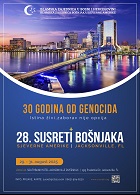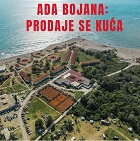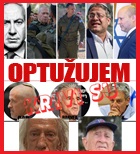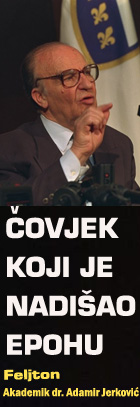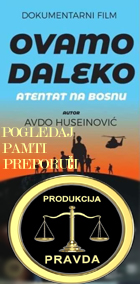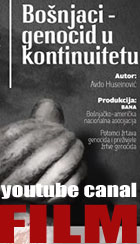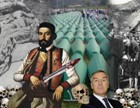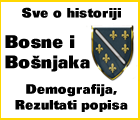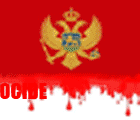
Teme
Letter from friends of Muhamed
SACIRBEY WORKED TO SAVE BOSNIA AND ITS PEOPLE FROM EXTINCTION AND GENOCIDE – ETHNIC CLEASING
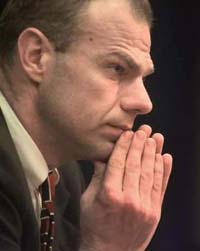 Without Muhamed Sacirbey, there would be no Bosnia and Herzegovina, according to people with an interest in the country. As BH’s highest representative to the UN, MS worked ceaselessly, brilliantly and passionately to: bring BH into being as a state; save it and its people from extinction and genocide/ethnic cleansing; and instill its society and institutions with democratic virtues. Because of his tireless work, the plight of tiny, far away BH was effectively and eloquently brought to the highest chambers of power as well as to millions of households around the globe. Given that the world then and still today overlooks many humanitarian catastrophes and widespread human rights abuses around the world, that MS riveted the world’s attention to a place like BH is testimony to his efforts. Without those efforts, BH and many more of its people would have been exterminated. People with lesser abilities would not have succeeded where MS did. And today, it is those people, whose energies, intellect and commitment to tolerance pale in comparison to MS’s that are leveling the baseless charges against him. In his tireless pursuit for justice and peace, he left a lasting impact on international human rights law. For example, because of his work, rape is now defined as a war crime and special protections exist internationally to protect women against violence. More than any other Bosnian official, he was responsible for the establishment of the International War Crimes Tribunal for the Former Yugoslavia. As vice chairman of the UN Commission on the creation of the International War Crimes court, he also played a critical role in the establishment of that body. In serving BH, MS also became a US ambassador of sorts, lobbying for the values he acquired during his upbringing in America: democracy, tolerance; respect for civil and human rights, initiative, hard work and personal responsibility. MS’s commitment, at risk to his own life, to peace and to the welfare of BH is undisputed. There are innumerable accounts of his efforts from news organizations and other sources from around the world. Richard Holbrooke, the famed American diplomat who was Bill Clinton’s chief Bosnia negotiator, gives one such account in his 1998 book “To End A War.” Holbrooke mentions MS in the first page of his book (the first of many references), relating a story of how gun-fire and bad weather had prevented him and his aides from flying into Sarajevo to jump-start peace talks. “Hearing that we could not reach Sarajevo, Bosnian Foreign Minister Muhamed Sacirbey, accompanied by the senior American diplomat in Bosnia, John Menzies, drove over Mount Igman (which RH called “the most dangerous road in Europe”) to meet us at the Split airport,” Holbrooke wrote, adding that MS was “Known to most Americans via television as the eloquent face of his embattled new nation.” Thirty pages later, RH describes how it was MS that drew him to the Bosnian cause. “Almost by chance, I began to edge into an involvement in the region. In the spring of 1992, I saw the Bosnian Ambassador to the United Nations, Muhamed Sacirbey, on television calling on the world to save his nation.
Without Muhamed Sacirbey, there would be no Bosnia and Herzegovina, according to people with an interest in the country. As BH’s highest representative to the UN, MS worked ceaselessly, brilliantly and passionately to: bring BH into being as a state; save it and its people from extinction and genocide/ethnic cleansing; and instill its society and institutions with democratic virtues. Because of his tireless work, the plight of tiny, far away BH was effectively and eloquently brought to the highest chambers of power as well as to millions of households around the globe. Given that the world then and still today overlooks many humanitarian catastrophes and widespread human rights abuses around the world, that MS riveted the world’s attention to a place like BH is testimony to his efforts. Without those efforts, BH and many more of its people would have been exterminated. People with lesser abilities would not have succeeded where MS did. And today, it is those people, whose energies, intellect and commitment to tolerance pale in comparison to MS’s that are leveling the baseless charges against him. In his tireless pursuit for justice and peace, he left a lasting impact on international human rights law. For example, because of his work, rape is now defined as a war crime and special protections exist internationally to protect women against violence. More than any other Bosnian official, he was responsible for the establishment of the International War Crimes Tribunal for the Former Yugoslavia. As vice chairman of the UN Commission on the creation of the International War Crimes court, he also played a critical role in the establishment of that body. In serving BH, MS also became a US ambassador of sorts, lobbying for the values he acquired during his upbringing in America: democracy, tolerance; respect for civil and human rights, initiative, hard work and personal responsibility. MS’s commitment, at risk to his own life, to peace and to the welfare of BH is undisputed. There are innumerable accounts of his efforts from news organizations and other sources from around the world. Richard Holbrooke, the famed American diplomat who was Bill Clinton’s chief Bosnia negotiator, gives one such account in his 1998 book “To End A War.” Holbrooke mentions MS in the first page of his book (the first of many references), relating a story of how gun-fire and bad weather had prevented him and his aides from flying into Sarajevo to jump-start peace talks. “Hearing that we could not reach Sarajevo, Bosnian Foreign Minister Muhamed Sacirbey, accompanied by the senior American diplomat in Bosnia, John Menzies, drove over Mount Igman (which RH called “the most dangerous road in Europe”) to meet us at the Split airport,” Holbrooke wrote, adding that MS was “Known to most Americans via television as the eloquent face of his embattled new nation.” Thirty pages later, RH describes how it was MS that drew him to the Bosnian cause. “Almost by chance, I began to edge into an involvement in the region. In the spring of 1992, I saw the Bosnian Ambassador to the United Nations, Muhamed Sacirbey, on television calling on the world to save his nation.Impressed with his passion and eloquence, I phoned him, introducing myself as an admirer of his cause, and offered my support. Sacirbey thus became my first Bosnian friend, although neither of us imagined that someday we would be negotiating together for his country’s future.”
| Draft Release Serbia isn\'t the only country not cooperating with the International War Crimes Tribunal on the Former Yugoslavia in The Hague. The U.S. Department of Justice and prison officials at the Metropolitan Correctional Center in Manhattan are barring investigators from The Hague from interviewing Muhamed Sacirbey, who as you know has been held at the MCC without evidence for more than one year. The investigators are already in New York, but have been stonewalled by DOJ and prison officials. This development is more puzzling because The Hague investigators have been in touch with DOJ and prison officials on this matter for more than two months, and flew here on assurances that they would get to interview Mo. What are these DOJ officials trying to hide? Are they doing this at the request of State Department officials? Why are they going to such great lengths to silence one man? Feel free to call Friends of Mo at (Susan/Paul/Cherif) To find out: Call Debora Caruth Trial Attorney Office of International Affairs United States Department of Justice Washington, D.C. 20530 Tel: (202) 514-2000 Fax: (202) 616-0762 Chuck English Director, Office of South Central European Affairs US Department of State 2201 C Street NW Washington, DC 20520 (202) 647-0608 (202) 647-0555 |
So, it can be concluded that without MS, RH may have never gotten involved in Bosnia. And had that happened, Bosnia might still be at war today, or worse. “Sacirbey was one of the bright hopes of the fledgling Bosnian government,” RH continued, (but) “his enemies in Bosnia attacked him for speaking his native language with an American accent. But when the new nation needed an
effective spokesman at the United Nations, Bosnia’s founder-President,Alija Izetbegovic, chose Sacirbey.”
“It was an inspired choice,” Holbrooke continued, “The terrible television pictures from Bosnia were deeply moving, but Americans needed to identify
with an articulate Bosnian who could personalize his nation’s cause. I was only one of many who, moved by his forceful public appearances, offered help…By the time he was promoted to Foreign Minister in 1995, Sacirbey was one of the two most important Bosnians (the other was Prime Minister Haris Silajdzic) with whom we dealt on a regular basis.” Upon being named BH’s Permanent Representative May 22, 1992, MS did not waste a moment in galvanizing world opinion. For example, on May 27, he talked on CNN about the recent breakdown of peace talks in Lisbon and continuing Serb atrocities against civilians. He told anchor Hilary
Bowker, “They (Belgrade) want us sitting at the table to prevent international
relief and United Nations actions and they want to continue bombarding and terrorizing our people as they did today.” Such postulations formulated by
MS, indicating Belgrade was using negotiations as a cover for genocide,were effective in their simplicity, and were quickly adopted by other Bosnian officials. By August, only three months into the job, MS had managed to push more than a dozen Bosnia-related resolutions through the Security Council – a pace of diplomatic activity unheard of a the world body up to that time. Also in this short time, this representative from this tiny country had brought to the world’s attention the ethnic cleansing and genocide that was taking place, and in so doing, ratcheted up pressure on countries many times more powerful.
For example, an August 5 Washington Post story (by Don Oberdorfer) about reports of concentration camps submitted by MS, reads, “The (Bush) administration’s effort to play down its knowledge of atrocities came amid
public pressure to take strong measures against widely reported atrocities…a senior State Department official who asked not to quoted by name said the pullback was ordered because pressure for action was mounting too swiftly.” Shortly afterwards, “The United States, Britain and France agreed on a draft resolution authorizing military force to protect aid shipments in war-ravaged Bosnia,” according to an August 10 Associated Press story. The story noted that MS welcomed the resolution, but continued to hustle for more to protect civilians. “Sacirbey asked for air strikes on Serbian positions to pressure the Serbs to end a campaign to drive Croats and Slavic Muslims from Serb-controlled areas. He asked for lifting of the U.N. Arms embargo…so Bosnians can defend themselves.” MS was as strategically creative a diplomat as he was aggressive, using tactics unheard of before. For example, he led a charge to expel Yugoslavia from the United Nations – something never done in the body’s 47-year-history. Thanks to MS, the UN expelled Yugoslavia in September, weakening its ability to act against BH. This was reported by CNN, the NYT and all other major news organizations. By the end of the year, MS had managed to push through another 10 Bosnia-related resolutions. He started 1993 the same way he ended 1992: working tirelessly in the UN, the media, US politics and elsewhere to bring peace and justice to BH.
On Feb. 10, 1993, for example, he pressed BH’s cause on CNN’s Crossfire program, squaring off with then House Minority Whip Newt Gingrich and then Colonel William Taylor, senior vice president of the Center for Strategic and International Studies. On the program, which centered a proposed plan to carve BH into ethnic enclaves, MS told host Pat Buchanan that “what troubles us about this plan is that the Bosnian provinces are ethnically improvised.”
He later added in the program, “If we’re also serious about bringing these war criminals to justice, then we must realize sooner or later we need to confront them with the force of international law…we have a problem in Bosnia because of a disease that’s originated in Belgrade. It’s fascism.” Some 12 hours later, on Feb. 11, he was on CBS This Morning, being interviewed by Paula Zahn (today a CNN news host) about increased US involvement in the Bosnian crisis. “I think genocide requires quite a different response; a more forceful response. Nevertheless, we are quite grateful for the United States to interject itself directly into these talks and to the process,” he told Zahn, later adding, “We frequently identify ourselves with the United States. It\'s probably no accident that I am the ambassador to the UN for Bosnia, having been really raised in this country. So anytime we see the American flag, we--we really can gain some strength from that. And in this instance, we are very grateful for that.”
While bringing peace and justice to BH was his first priority, he knew they could not be achieved without BH being preserved as a multi-ethnic nation like America, and that it needed American values. He made that case daily in the press, including on March 26, 1993, on National Public Radio, “For us, all of Bosnia is Bosnian territory no matter what ethnic group happens to be in that area. You see, we don\'t have a problem with Serbs controlling a large part of Bosnian territory. We have a problem with Serbs who are committed to ethnic cleansing, who are committed to a fascist ultra-nationalist system controlling that territory because what that means is that no one else can live in that territory,” he said. While he was a daily voice in the news, MS’s efforts at the UN and in other circles were less in view of the American public. Any diplomat from that era, however, will tell you that he was the hardest working ambassador around. He did in a day what most ambassadors did in a week. His days usually started between 4 and 6AM with phone calls to Sarajevo and morning meetings, and ended at midnight or 1AM, with more calls, speech, letter
and resolution writing, and strategizing. He constantly spoke with diplomats from almost all countries, usually convincing them of the righteousness of the BH cause. For example, in 1993 and subsequent years, MS won the sponsorship of Costa Rica for resolutions that would have sent the Bosnians arms with which to defend themselves.
Winning that sponsorship was a bit of a miracle and testament to MS’s efforts, because Costa Rica is country that rejects maintaining its own army. In 1993, MS was also appointed BH’s agent before the International Court of Justice, when he launched BH’s case at the court against Yugoslavia for genocide. In 1993, he was also appointed BH’s representative to the World Bank, and the International Monetary Fund.
MS was also constantly speaking at functions hosted by non-governmental organizations, religious groups, universities and high schools. He actively involved artists and cultural figures, such as the Irish rock group U2 and actor John Malkavich. He brought many injured and sick Bosnian children to the US and to the west securing free medical treatment for them from various hospitals.On June 1, 1995, MS succeeded Irfan Ljubljankic, who was killed when his helicopter was shot down by Serb forces a few days earlier, as foreign minister. Although he had been in and out of Sarajevo many times before, usually traveling over the hazardous Mt. Igman Road, MS increased the frequency with which he visited Sarajevo at a time when many people were seeking to escape the city. He did this not only when it was necessary to meet high government officials, but often when it wasn’t, as an expression of solidarity with the city’s people. On such visits, he made it a habit to give the few dollars or Deutsche marks that he had earned to people he would run into in the city. On at least one such visit, he was nearly killed by mortar fire along with then vice president Ejup Ganic (two drivers and others in his convoy were killed), who together carried a wounded civilian down Igman into Sarajevo, saving her life. As foreign minister, MS was incredibly effective, with BH signing a peace treaty, known as the Dayton Accords, within five months after he took office.
In the process leading up to the Dayton signing, MS had been even more vocal and active, sleeping barely 30 hours per week. But his voice, and in turn Bosnia’s, was being heard around the globe. For example, in the wake of the Serbian massacre in the eastern Bosnian village of Srebrenica, when 7,000 civilians were butchered, MS was especially effective. \"You have 30,000 UN soldiers in Bosnia - what the heck are they doing there? I mean, this seems like one big camping trip,\" MS was quoted as saying in a July 16 Toronto Sun column by Bob MacDonald, titled, “UN ON USELESS CAMPING TRIP.” The column concluded,” The world watches -
sighs, sheds a small tear, and goes to the fridge to get another cold one. Hello, Neville Chamberlain - you\'re back in style.” That same day, the Boston Globe reported, “Clinton is under growing pressure to act, particularly by the Bosnian government. ‘When it comes to the issue of the long-term future of Bosnia\'s defense, it\'s certain this is where the future is,’\" Bosnia\'s foreign minister, Mohamed Sacirbey, said as he prepared to leave for Washington, where he will address Congress.” Six weeks later, western nations acted thanks to MS efforts in the wake of Serbian shelling that killed more than 30 people in Sarajevo in late August. An Aug. 25, 1995 report from the German News Agency led with the following
sentences: “Bosnian Foreign Minister Mohamed Sacirbey heavily attacked the international community Monday over the mortar attack in Sarajevo that killed 33 people. He said the international community was trying to ‘buy time’ in order to avoid having to start retaliatory action against the Bosnian Serbs, whom he blamed for the attack. ‘I find it absurd that five to eight shells hit Sarajevo within 20 minutes and no one knows where they came from,’ said Sacirbey, who is accompanying President Alija Izetbegovic to Paris. ‘We all know where they came from, and it\'s a matter of buying time in order to avoid a response,’ addes Sacirbey.”
NATO finally bombed Serb positions a few days later, paving the way for a new chance at peace. By late November, peace was achieved, in large part because of a selfless move made by MS: he resigned his post as foreign minister to make room for someone else from another ethnic group. An Associated Press story by Barry Schweid from Nov. 18, 1995 started,“Making his ‘own sacrifices,’ Bosnia’s foreign minister is resigning, as the United States intensified efforts today to resolve differences between the Balkan leaders on key issues.” The story quoted MS as saying “We need to create room for Bosnian Croats to participate…They need a top job in government of Republic of Bosnian and Herzegovina, which means the president, the prime minister or foreign minister.”
China’s Xinhua News Agency, also in an Nov. 18 story, reported MS’s courageous move like this: “Bosnian foreign minister Mohamed Sacirbey offered his resignation early on Saturday to pave the way for a potential final comprehensive peace agreement at the talks of three Balkan rival leaders in Dayton, Ohio…(Sacirbey) had offered his resignation to Bosnian president Alija Izetbegovic to make room for him to appoint a Croatian in the post and thus bolster the country’s newly formed Federation of Muslims and Croatians. ‘The country has to have a Croatian in one of its top three posts. The president isn’t going and the prime minister doesn’t want to
go. So I decided I would go,’ he (MS) said.” While a peace agreement had been secured, MS did not let up in his efforts, now channeling them in the pursuit of justice. He was a vocal advocate for bringing war criminals to trial. “’Some people are scared of justice,’ outgoing Bosnian Foreign Minister Muhamed Sacirbey told CNN.’... ‘We think justice is the main way we are going to achieve peace and reconciliation in our country.’ he told CNN ON 12/14/95. A March 28, 1996 story in the New York Times by Barbara Crossette, opened by saying, “Bosnia\'s representative at the United Nations accused the United States today of failing to turn over information on a notorious Serbian paramilitary leader known as Arkan, who has been linked to killings of Bosnian Muslims as late as last autumn. The representative, Muhamed Sacirbey, said at a news conference that Washington had ‘conclusive evidence’ of ties between Arkan, whose real name is Zeljko Raznatovic, and the Government of President Slobodan Milosevic of Serbia.”
The story continued: “Mr. Sacirbey essentially charged that the United States, needing the cooperation of President Milosevic to enforce the Dayton peace accords, was holding back information that might lead to questions about Serbian involvement in the massacres of Bosnians… Today Mr. Sacirbey said Mr. Milosevic had been handed an account of the activities of Mr. Raznatovic by Richard C. Holbrooke, the former Assistant Secretary of State who brought the Balkan parties together at the Dayton, Ohio, conference.‘If Mr. Milosevic is entitled to that written information, then I\'m not sure why we, the Bosnians, the international community, or The Hague war crimes tribunal is not,’ Mr. Sacirbey said.” MS was not afraid to confront countries about the issue of war crimes.
According to the Dec. 19, 1997 story from Agence France Presse, “Bosnia-Hercegovina\'s representative at the United Nations slammed France for what he described as its \"disdain\" for the UN war crimes tribunal in The Hague. ‘We are concerned by recent reports, widely publicized in the press, which seem to some to indicate a lack of respect, or even disdain, for the tribunal\'s mandate,’ Mohamed Sacirbey said during a UN Security Council debate Thursday on Bosnia. Sacirbey did not mention France explicitly, but clearly alluded to Paris\' refusal to allow French peacekeepers who were in Bosnia during the civil war to testify before the war crimes tribunal,” the story said. MS pursued a lawsuit, initiated thanks to his efforts, with equal vigor for Bosnia against Serbia at the International Court of Justice. In the suit, Bosnia charged the Milosevic regime with sponsoring genocide. According to an April 23, 1998 AP story, “Bosnian officials Thursday handed to the World Court a 973-page document they claim contains ‘extensive evidence’\' of Serbian genocide committed during the Bosnian war…. Authorities of the Federal Republic of Yugoslavia made up of Serbia and Montenegro have until Jan. 23, 1999, to respond in writing to Bosnia\'s allegations. No ruling is expected until the end of 1999 from the 15-judge court, formally known as the International Court of Justice. Bosnia\'s U.N. Ambassador, Muhamed Sacirbey, disputed Serb claims that the case is an obstacle to reconciliation between Bosnia and Serbia. \'\'We do not agree in any way ... that this is meant to frustrate relations,\'\' Sacirbey said.” The story went on to say that Sacirbey hoped the case would make it easier to prosecute Slobodan Milosovic for war crimes.
MS was also instrumental in cultural exchanges between Bosnian artists and artists from other countries, exchanges that were meant to heal the country, inform the world about it, and give its artists an opportunity to breathe. In those efforts, he not only managed to brought a slice of the America he grew up in to BH, but in one of the more unusual twists in his dynamic career, revived the careers of Cat Stevens and Grand Funk Railroad. Both Stevens and Grand Funk emerged from years of musical dormancy to perform benefit concerts for Bosnia and record albums with proceeds going to Bosnian causes. On Aug.13, David Fishoff, Grand Funk’s manager wrote to fans on a band website: “Grand Funk donated the money from your concert tickets and merchandising revenues to help rebuild the schools in the Bihac region of Bosnia. Keeping his promise, Ambassador Muhamed Sacirbey, the Bosnian Ambassador to the United States, gave a major presentation on July 23 honoring Grand Funk for their donation to Bosnia.” Fishoff went on to tell fans “Please feel free to write to the United Nations Ambassador Sacirbey to thank him for being a major force in bringing the band back together. Your letters of support will really help the band and the Bosnian relief cause.”As Bosnia faded from the world’s televisions and newspapers with the close of the 20th century, MS remained an active voice for promoting tolerance, justice and reconciliation. He continued to be invited to speak a numerous universities and to non-governmental groups, taking special pleasure in working with young people. For example, in February, 2000, MS was the keynote speaker at Harvard’s National Model United Nations, which involved more than 2,000 college students from all over the world. He also continued to pursue justice in Bosnia’s case against Yugoslavia at The Hague, and elsewhere. He had become such a respected voice in the international community, that when UN Secretary General Kofi Annan was awarded the Nobel Peace Prize, ABC news asked MS to comment “People trust him because he is honest. He doesn’t try to hide behind a false argument,” MS told ABC. For his many years of trying to bring peace, justice and tolerance to Bosnia, MS won much deserved recognition as well.
On November 16, 1999, the UN International Day for Tolerance, was part of a group that was comprised of Mikhail Gorbachev, Zubin Mehta, Arnold Schwartzenegger, Daphna Ziman, Dr. Michael DeBekay, Melba Moore and Little Richard to receive a “Global Peace and Tolerance Lifetime Achievement Award.” The sponsors, including “Children United Nations, the DeCapo Foundation and Friends of the United Nations, cited MS’s dedication to peace and tolerance. Only one month before that, the 45th General Assembly of the Atlantic Treaty Association, a collection of groups that promotes NATO, also recognized MS for his efforts towards peace.
FOM - Friends of Muhamed



